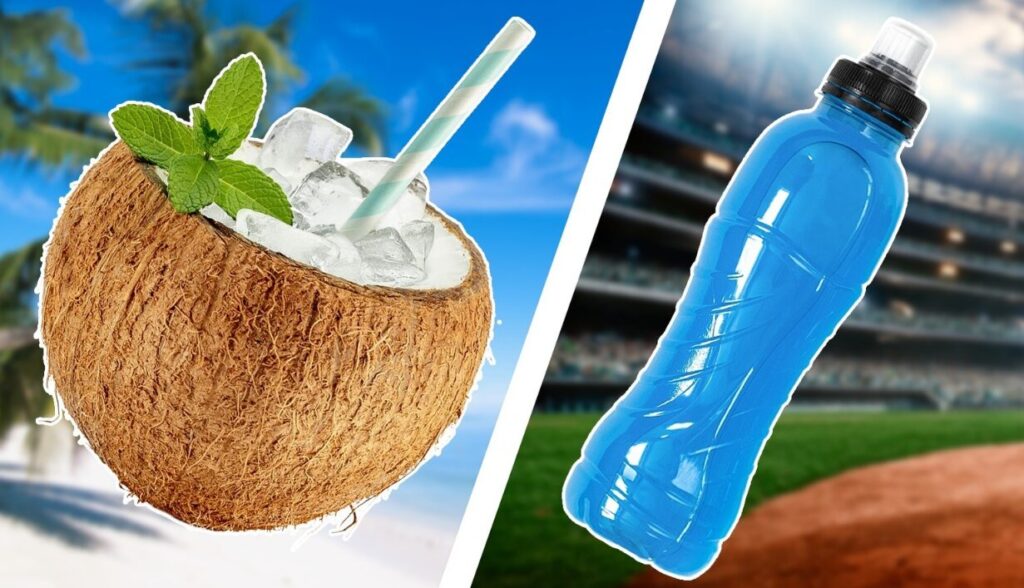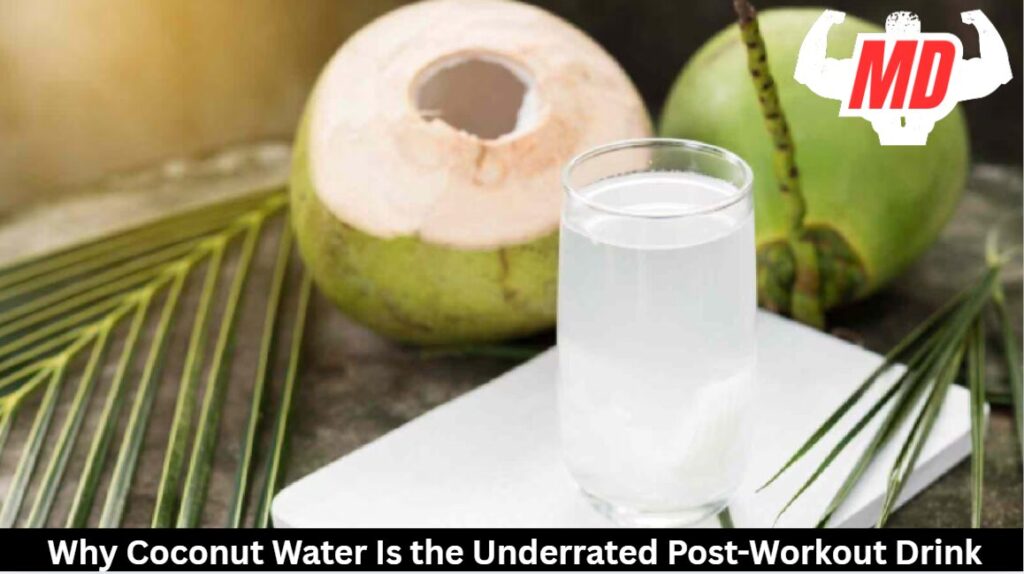Coconut water outperforms commercial sports drinks with its natural electrolyte profile containing 15 times more potassium and just 5g of sugar per serving. Your body absorbs its nutrients efficiently, supporting muscle function and preventing cramping. For best results, drink 8-12oz within 30 minutes after moderate workouts or 16-24oz following intense sessions. It’s also more environmentally friendly and cost-effective than specialized recovery products.
Discover why athletes are making the switch to this natural performance booster.
How Coconut Water Compares to Sports Drinks on Natural Electrolyte Profile
While traditional sports drinks dominate the market with bright colors and bold claims, coconut water quietly offers a superior electrolyte profile derived entirely from nature. Unlike manufactured beverages, coconut water contains a balanced mix of potassium, magnesium, sodium, and calcium in proportions your body easily recognizes and absorbs.
You’ll find coconut water delivers up to 15 times more potassium than most sports drinks, helping prevent muscle cramps during recovery. It also provides these electrolytes with considerably less sugar, typically 5g per serving compared to 14g in commercial options.
Coconut water is an ideal hydration solution that won’t spike your insulin levels after exercise. The natural composition means your body processes it efficiently, optimizing post-workout recovery without artificial ingredients.

Coconut Water’s Recovery-Boosting Properties
The main benefit is still hydration, but coconut water provides a few other recovery benefits that many athletes do not realize. Its impressive potassium content compared to most sports drinks directly supports muscle function and helps prevent cramping after intense workouts.
When you consume coconut water post-workout, you’re not just quenching thirst; you’re delivering a natural hydration solution that helps restore cellular fluid balance faster. The medium-chain triglycerides present can provide a gentle energy boost that aids exercise recovery without the crash associated with high-sugar alternatives.
What’s more, coconut water contains cytokinins, plant hormones with anti-inflammatory and anti-aging properties that may help reduce exercise-induced inflammation and accelerate your body’s natural recovery processes.

When and How to Consume Coconut Water for Maximum Benefits
To maximize coconut water’s recovery benefits, timing plays an essential role in your post-workout nutrition strategy. Take a sip 30 minutes after exercise when your body’s absorption rate is peaking for optimal rehydration benefits. A single serving (8-12 oz) works for moderate workouts, while intense sessions might require 16-24 oz to combat post-exercise fatigue.
For muscle cramp prevention, sip small amounts throughout your workout, especially during hot conditions. Pair coconut water with a small protein snack to enhance nutrient balance and support muscle repair.
During prolonged endurance activities, alternate coconut water with water. This approach can keep electrolytes up while supporting energy replenishment without overloading your body with natural sugars.
Research Supporting Coconut Water for Athletes
Multiple peer-reviewed studies support coconut water as a natural recovery beverage for athletes. Studies reported in the Journal of the International Society of Sports Nutrition found coconut water comparable to commercial sports drinks in hydrating properties, without the unhealthy artificial ingredients.
Glycogen stores are refilled in coconut water, supporting exercise performance and shortening recovery time, studies show. Southeast Asian universities report that coconut water’s unique antioxidant profile neutralizes exercise-induced free radicals and may even prevent muscle damage.
A 2018 study involving endurance athletes showed that regular coconut water consumption provided significant performance support, with participants reporting less fatigue and improved stamina compared to those using traditional sports drinks.
The Practical Advantages of Choosing Coconut Water
Beyond its nutrient profile, coconut water has practical benefits that make it appealing to health-conscious athletes. It’s greener than bottled sports drinks, since many brands go for sustainable packaging and ethical farming.
While premium coconut water might seem expensive initially, it’s actually cost-effective compared to specialized sports recovery products. There are affordable options at most grocery stores, making it accessible for regular consumption.
For those watching their budget, buying coconut water in bulk or opting for frozen varieties can further reduce costs. The versatility of coconut water also adds value. You get a recovery drink that doubles as a healthy beverage throughout your day, eliminating the need for multiple specialized products.

Frequently Asked Questions
Is Coconut Water Safe for People With Kidney Problems?
If you have kidney problems, you should consult your doctor before drinking coconut water. Its high potassium content may pose risks for those with impaired kidney function who can’t process potassium efficiently.
Can Coconut Water Interact With Certain Medications?
Yes, coconut water can interact with some medications. If you’re taking blood pressure drugs, potassium-sparing diuretics, or certain heart medications, you should consult your doctor before making it your regular drink.
Does Coconut Water Expire Quickly Once Opened?
Yes, consume opened coconut water within 24-48 hours when refrigerated. It ferments quickly due to its natural sugars and nutrients. Always check for off smells or tastes before drinking stored coconut water.
Is Coconut Water Suitable for Diabetic Athletes?
Yes, you can enjoy coconut water as a diabetic athlete, but monitor your intake since it contains natural sugars. It contains less sugar than sports drinks.
How Does Coconut Water Affect Blood Pressure During Exercise?
Coconut water’s potassium content may help regulate your blood pressure during exercise by counterbalancing sodium’s effects. It’s naturally low in sodium, which can help you maintain healthier blood pressure levels while working out.



